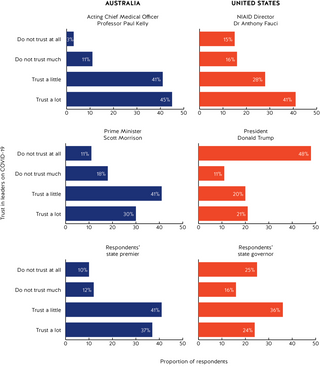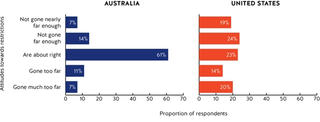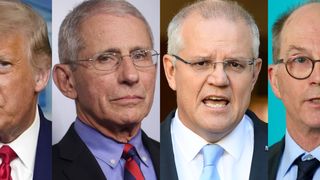The United States Studies Centre, La Trobe University, the University of Melbourne Policy Lab and YouGov polled 1,060 Americans and 1,375 Australians to find out who was trusted most as a source of information on COVID-19 — leading health experts or elected officials. The surveys also assessed sentiment toward mandated measures designed to reduce the spread of COVID-19.
Key findings
Trust in leaders as sources of information on COVID-19
- In both countries, respondents had more trust in the information provided by a health expert — Acting Chief Medical Officer Professor Paul Kelly in Australia, and Director of the National Institute of Allergy and Infectious Diseases Dr Anthony Stephen Fauci in the United States — than they did in elected officials.
- However, in Australia, trust in elected officials was also high. Thirty per cent of respondents had a lot of trust in Prime Minister Scott Morrison and 41 per cent had a little trust in him. Very few had not much or no trust. Support for premiers was even higher: with 37 and 41 per cent of Australian respondents saying they had a lot or a little trust in their state leaders.
- In the United States, trust for President Trump as lower: with 21 per cent of Americans saying they trusted him a lot and 20 per cent a little. Forty-eight per cent did not trust him at all: the highest rate of no trust in our data. Twenty-four and 36 per cent of Americans also said they trusted their state governors a lot or little. One-quarter of respondents did not trust their governor at all: a much higher rate than the Australian equivalent.
- Part of the reason for this difference was the effect of partisanship in the United States. While many Labor supporters trust Coalition premiers and Prime Minister Scott Morrison, and many Coalition voters trust Labor premiers, in the United States few Republican voters trust Democratic governors, few Democratic supporters trust Republican governors, and fewer still trust President Donald Trump.
Support for restrictions on movement and gatherings
- Related to this, support for restrictions on movement and gatherings were mixed. Americans were more likely to say lockdowns had gone too far, or not far enough.
- In comparison, Australians were considerably more likely to say they were about right (61 per cent versus 23 per cent in the United States).
- As above, this was partially driven by partisanship, with Republicans and Democrats heavily divided on the issue: Republicans are more likely to say restrictions had gone too far and Democrats are more likely to say they had not gone far enough. In comparison, there were only small levels of partisan division on the issue in Australia.
Figure 1. When accessing information about the coronavirus, how much do Americans and Australians trust their leaders?

Figure 2. Attitudes of Australians and Americans towards restrictions in movement and gatherings in public designed to reduce the spread of COVID-19

Media enquiries
Taylor Mellor
T 02 9114 2622
E Taylor.Mellor@sydney.edu.au
About the data
This survey was fielded on the YouGov panel between 31 August and 9 September 2020, to 1,060 American and 1,375 Australian respondents. The study was funded by the United States Studies Centre at the University of Sydney, La Trobe University and the University of Melbourne Policy Lab.
Both the United States and Australian data were weighted to be representative of each country’s population. Australian data were weighted by age, gender and region. United States data were weighted by age, race, gender and education.
After weighting, the margin of error is plus/minus 3 percentage points for the full sample of each survey. These are larger when analysing sub-groups within each country.
Questions
Australia
Vote intention
If a Federal election was held this Saturday, which of these parties would you give your first preference vote in the House of Representatives?
Please select one option only
- The Liberal Party
- The Liberal-National Party (Queensland only)
- The Australian Labor Party
- The Nationals
- The Greens
- Pauline Hanson’s One Nation
- Another party or candidate
- Will not vote
- Don’t know
The order of each of these was randomised to minimise order effects.
Trust in leaders
When accessing information about the coronavirus, how much do you generally trust the following sources?
Select one answer for each.
- The Prime Minister, Scott Morrison
- Acting Commonwealth Chief Medical Officer, Professor Paul Kelly
- The Premier of your State
The order of each of these was randomised to minimise order effects.
- Trust a lot
- Trust a little
- Do not trust much
- Do not trust at all
Response options were randomly reversed to minimise order effects.
Support for restrictions
Would you say the restrictions in movement and gatherings in public designed to reduce the spread of the coronavirus strain known as COVID-19 have gone too far, are about right, or have not gone far enough?
- Gone much too far
- Gone too far
- Are about right
- Not gone far enough
- Not gone nearly far enough
- Don’t know
Response options were randomly reversed to minimise order effects.
The United States
Vote intention
If the election for president were being held today, whom would you vote for?
Please select one option only
- The Republican candidate, Donald Trump
- The Democratic candidate, Joe Biden
- Another candidate
- Will not vote
- Don’t know
The order of each of these was randomised to minimise order effects.
Trust in leaders
When accessing information about the coronavirus, how much do you generally trust the following sources?
Select one answer for each.
- The President, Donald Trump
- Director of the National Institute of Allergy and Infectious Diseases, Dr Anthony Fauci
- The Governor of your State
The order of each of these was randomised to minimise order effects.
- Trust a lot
- Trust a little
- Do not trust much
- Do not trust at all
Response options were randomly reversed to minimise order effects.
Support for restrictions
Would you say the restrictions in movement and gatherings in public designed to reduce the spread of the coronavirus strain known as COVID-19 have gone too far, are about right, or have not gone far enough?
- Gone much too far
- Gone too far
- Are about right
- Not gone far enough
- Not gone nearly far enough
- Don’t know
Response options were randomly reversed to minimise order effects.









